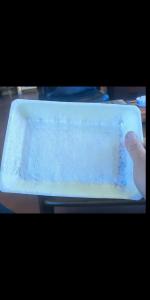Bioplastics International Earns USDA Biopreferred Status for Sugar Cane PVA Foam Meat Trays, Gloves, Films, and Bags
Bioplastics Internation Earns USDA Certified Biobased Product Label for World's First Water Soluble Bio PVA to Replace Plastics
"We applaud Bioplastics International for earning the USDA Certified Biobased Product Label," said Vernell Thompson, USDA BioPreferred Program. "The label is intended to help spur economic development, create new jobs, and provide new markets for farm commodities. But the label also makes it easier for consumers and federal buyers to locate biobased products and consider planet-friendlier options during purchase decisions. By having their products become USDA Certified Biobased, Bioplastics International joins an expanding list of businesses combatting inaccurate marketing claims and the practice of greenwashing, while also contributing to a thriving bioeconomy that decreases our reliance on petroleum."
Our oceans have become the world’s largest landfill, accumulating more than 13 million tons of plastic annually, adding to the current 200 million tons currently in our seas, according to Bioplastics International, the creator of the world’s first patent pending, water soluble, sugar cane PVA (Polyvinyl Alcohol). In an attempt to stop the overwhelming plastic pollution of our oceans, Bioplastics International has created a non fossil fuel, water soluble, no waste replacement for petroleum based plastics.
Garrett Valentino, CEO of Bioplastics International, said, “No more confusion of the outdated terms biodegradable, compostable, or bio based, the only option to save our planet and oceans is water soluble, no waste! We are very excited to receive the USDA Biopreferred Status for our water soluble sugar cane PVA foam meat trays, films, disposable food handling gloves, and bags!”
“Until now, all PVA has been made from fossil fuel natural gas, such as the laundry pods on the market, which simply become liquid plastic. When fossil fuel carbon dioxide enters the ocean, it lowers the pH levels,, resulting in the death of shellfish, corals, plankton, and soon other sea life. In the past 150 years, approximately one third of all CO2 from fossil fuels, roughly 500 billion tons, has been absorbed by our oceans, increasing the average acidity by 30%” Valentino said.
“Our PVA is made from sugar cane and alcohol, unlike all other PVA’s, which are made from fossil fuel natural gas. Ours contain no plastics, no toxins, no heavy metals, no chemicals, and no bioplastics. It dissolves in water in minutes, leaving behind bio carbon dioxide through photosynthesis and water. It does not leave behind any microplastics or any residues. Through crystallization, we can control the temperature when our sugar cane PVA will dissolve in any water, minutes, to months.” he affirmed.
He stressed that PVA is safe for human consumption, having been approved by the USFDA, and is currently used as a food additive in dairy products, baked foods, candy bars, cereals, dried fruits, and many more. It is also used in the medical industry as “advanced biomedical applications such as wound dressing, wound management, drug delivery systems, artificial organs, as well as a vital ingredient in eye drops,” elaborated Valentino
Furthermore, hundreds of thousands of sea turtles, fish, birds, and marine mammals are killed every year from ingesting plastics. Our sugar cane PVA products are non-toxic to animals or humans, claims Valentino, adding that it can be eaten by sea turtles, fish, birds, marine and land animals, and it will safely pass through their digestive systems.
The water-soluble, net zero carbon dioxide polymer can be mass produced in vast quantities and can be used for blown films, extrusion, or injection molding processes.
“The current ocean plastic pollution issue is beyond catastrophic, and must be immediately addressed. “We cannot ignore this, if nothing is done, by 2050 we will have more plastic in our oceans than fish. Our ocean plastic pollution doubles every six years, there is no stopping it. For every three tons of fish in our oceans, there is one ton of plastic. Approximately 70 % of the oxygen we breath comes from our oceans, and how do humans plan to survive?” said Valentino.
Garrett Valentino
Bioplastics International
+1 425-522-3645
email us here
Visit us on social media:
LinkedIn
Legal Disclaimer:
EIN Presswire provides this news content "as is" without warranty of any kind. We do not accept any responsibility or liability for the accuracy, content, images, videos, licenses, completeness, legality, or reliability of the information contained in this article. If you have any complaints or copyright issues related to this article, kindly contact the author above.

